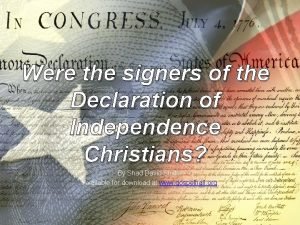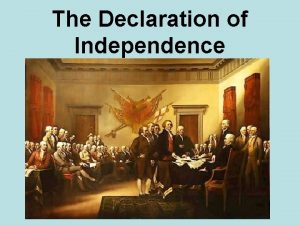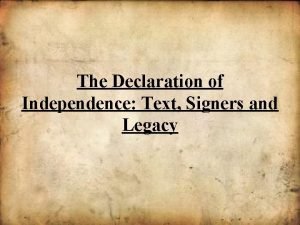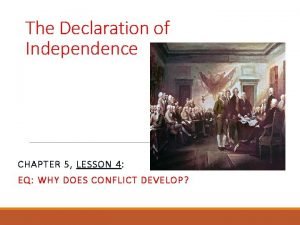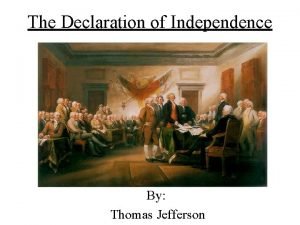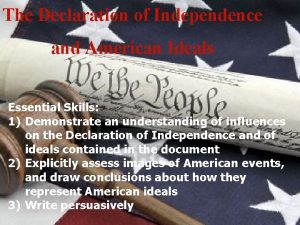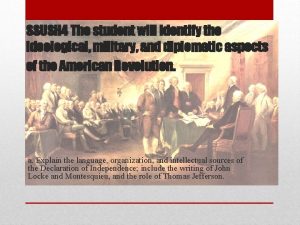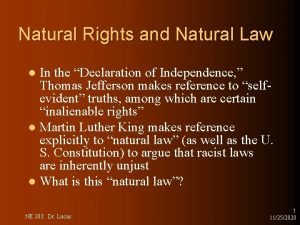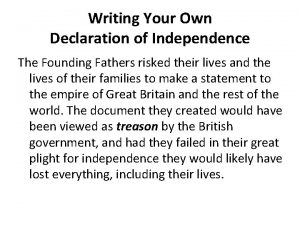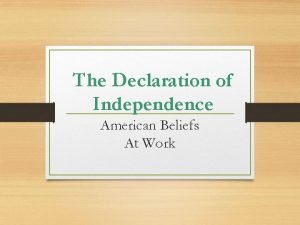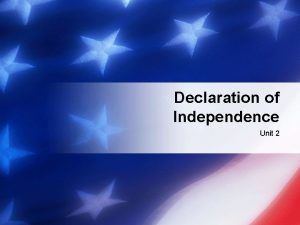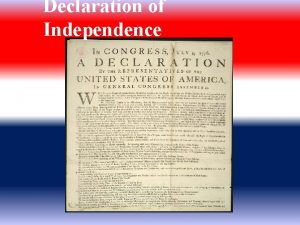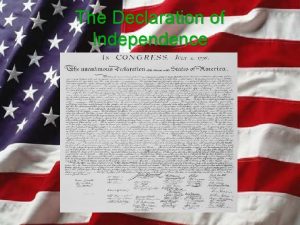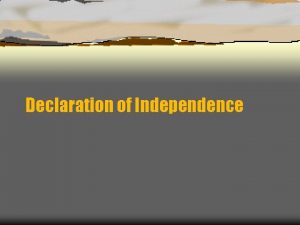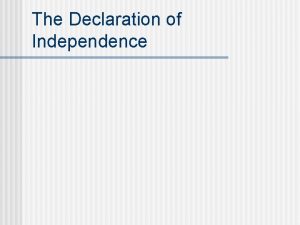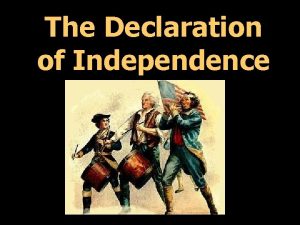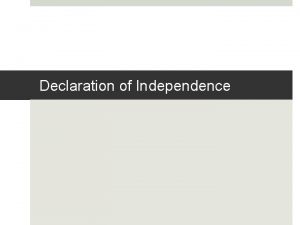The American Revolution The Declaration of Independence One











- Slides: 11

The American Revolution & The Declaration of Independence One of the most important formative events in American history.

The American Revolution • (1754 -1763) French and Indian War o The British government was left with a large debt o Imposed a series of new taxes on the colonies to pay the debt • Stamp Act • Townshend duties • Tea duty o “taxation without representation” • 1773 – Boston Tea Party o A group of colonists dressed as Indians threw tea off British ships • 1775 – Lexington and Concord o “the shot heard round the world”

Jonathan Trumbull, Sr. • • Governor of Connecticut Refused to help British General Thomas Gage, informing Gage that he would act instead in support of the colonial patriots A close friend of George Washington The only colonial governor to side with the colonists Spoke in favor of colonial rights and against English abuses Supplied Washington’s army with food, clothing, and munitions Became Connecticut’s first state governor

John Peter Muhlenberg • Protestant Minister • Enlisted more than 100 men into the Continental Army • Became part of the “Black Regiment” o A group of ministers who wore black clerical robes while preaching and who worked to recruit large numbers of volunteers for the Revolutionary cause • Rose to the rank of General under Washington • Later served as a U. S. senator and congressman

The Declaration of Independence • A committee of five was charged to write the Declaration of Independence o Thomas Jefferson, John Adams, Benjamin Franklin, Roger Sherman, Robert Livingston o Thomas Jefferson wrote the majority of the Declaration. • Final document was issued on July 4, 1776 • Put forward a theory of government o Many of its ideas were borrowed from the English philosopher John Locke

The Declaration of Independence • https: //www. youtube. com/watch? v=5 o. PXd 5 -L 13 o • Get with your shoulder partner! • Rewrite each paragraph of the Declaration in your own words.

Signers of the Declaration of Independence • 56 delegates from all 13 colonies met to sign the Declaration. • The British viewed the Declaration as an act of treason, punishable by hanging. • The following men are all signers and important patriots of the American Revolution o o John Hancock Benjamin Rush Charles Carroll Dr. John Witherspoon

John Hancock • Made the largest and most recognizable signature on the declaration • A prosperous merchant from Boston • President of the Continental Congress • Hancock’s name became second only to George Washington’s as a symbol of freedom in the colonies.

• • Benjamin Rush A physician, educator, and humanitarian Sometimes known as the “father of American medicine” A pioneer in the fields of physiology and psychiatry Known for his proposal to establish a national public university to train public servants Favored the education of women Helped establish the oldest African-American church in the country His son later became the U. S. Ambassador to England.

Charles Carroll of Carrollton • One of the wealthiest men in the colonies • Helped to finance the Revolution with his own money • One of the first to recognize the necessity for independence from Britain • A Catholic o Catholics made up less than 2% of the colonial population and lacked political rights • Helped in the struggles for the acceptance of the Roman Catholic religion in America.

John Witherspoon • A Scottish immigrant • A leading member of the Continental Congress • A Presbyterian clergyman • Became President of the College of New Jersey (later known as Princeton University)
 What does the declaration of independence say
What does the declaration of independence say Grievances in the declaration of independence
Grievances in the declaration of independence Declaration of independence sections
Declaration of independence sections Declaration of independence sections
Declaration of independence sections Lesson 4 declaring independence
Lesson 4 declaring independence Declaration of independence all men are created equal
Declaration of independence all men are created equal Ideals in the declaration of independence
Ideals in the declaration of independence Montesquieu declaration of independence
Montesquieu declaration of independence Natural rights
Natural rights Thomas hobbes declaration of independence
Thomas hobbes declaration of independence Creating your own declaration of independence
Creating your own declaration of independence Grievances in the declaration of independence
Grievances in the declaration of independence
